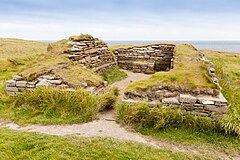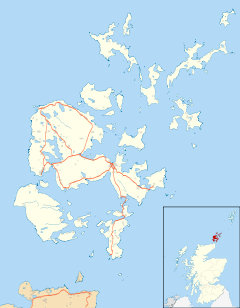Deerness
| Deerness | |
|---|---|
 Brough of Deerness showing the remains of the chapel | |
Location within Scotland | |
| Council area | |
| Country | Scotland |
| Sovereign state | United Kingdom |
| Police | Scotland |
| Fire | Scottish |
| Ambulance | Scottish |


Deerness (/ˈdɪərnɪs/, locally /ˈdɛrnɪs/, Old Norse: Dyrnes) is a quoad sacra parish[2] (i.e. one created and functioning for ecclesiastical purposes only) and peninsula in Mainland, Orkney, Scotland. It is about 13.5 kilometres (8.4 mi) south east of Kirkwall. Deerness forms a part of the civil parish of St. Andrews and Deerness.[3][4] There is a shop/post office and a community centre and the Deerness Distillery.
Deerness is connected to the rest of the Orkney Mainland by a narrow isthmus, known as Dingieshowe. Deerness parish consists chiefly of the peninsula, but also takes in its surrounding islets of Copinsay, the Horse of Copinsay and Corn Holm.[5] The Brough of Deerness is the site of an early Christian monastery near the north eastern tip of the peninsula. The Gloup is a sea-cave approximately 40 metres (44 yd) long and 25 metres (82 ft) deep just south of the Brough.
The Crown of London shipwreck[edit]
The Covenanter's Memorial at Deerness, commemorating the loss in a shipwreck of 200 Covenanters en route to the New World of America (as a punishment), was largely paid for by Robert Halliday Gunning. The inscription on the monument reads "For Christ His Crown Covenant, erected by public subscription Aug. 1888 to the memory of the 200 covenanters who were taken prisoners at Bothwell Bridge, and sentence to transportation for life; but who perished by shipwreck near this spot on 10th December 1679."[6]
John Blackadder recorded that a prisoner related the following:[7]
"The prisoners were all shipped in Leith Roads (15 November) in an English captain's vessel to be carried to America. He was a profane cruel wretch, and used them barbarously, stowing them up between decks, where they could not get up their heads except to sit or lean, and robbing them of many things their friends sent them for their relief. They never were in such strait and pinch, particularly through scorching drought, as they were allowed little or no drink, and pent up together, till many of them fainted, and were almost suffocated. This was in Leith Roads [i.e., before they sailed] besides what straits they would readily endure in the custody of such a cruel wretch. In this grievous plight, these captives were carried away in much anguish of spirit, pinched bodies, and disquieted conscience, (at least those who had taken the bond.) They were tossed at sea with great tempest of weather for three weeks, till at last their ship cast anchor, to ride awhile among the Orkney isles, till the storm might calm. But after casting anchor, the ship did drive with great violence upon a rugged shore about the isles, and struck about ten at night on a rock. The cruel captain saw the hazard all were in, and that they might have escaped, as some did; yet, as I heard, he would not open the hatches to let the poor prisoners fend for themselves. He, with his seamen, made their escape by a mast laid over between the ship and the rock ashore. Some leapt on the rock. The ship being strong, endured several strokes ere she bilged. The captain, and all the rest of the seamen, with about fifty prisoners, some of whom had been above deck before, others had broke out some other way, down to the den, and so up again, so that they wan to land with their life in; one or two died ashore. While these were thus escaping, the rest, who had all been closed up between decks, crying most pitifully, and working, as they could, to break forth of their prison, but to little purpose; and all these, near two hundred, with lamentable shrieks of dying men, (as was related to the writer by one who escaped,) did perish. The most part were cast out on the shore dead, and after buried by the country people. It was found, by some who examined those that escaped, that many of them had refused to take the bond. Yet a few of those who had not taken it were drowned; albeit this is soberly marked because these outward things fall much alike to all. It was, however, a puzzling dispensation like many others."
Notable people[edit]
Edwin Muir was born in Deerness in 1887.
References[edit]
- Citations
- ^ Blackadder 1826, p. 230-232.
- ^ Scott 1928.
- ^ Sinclair 1798, p. 258.
- ^ Anderson 1893.
- ^ Wilson 1882.
- ^ Arbuckle 2020.
- ^ Blackadder 1826.
- Sources
- Anderson, Joseph, ed. (1893). Orkneyinga Saga. Translated by Hjaltalin, Jón A.; Goudie, Gilbert. Edinburgh: James Thin and Mercat Press (1990 reprint). ISBN 0-901824-25-9.
- Arbuckle, Susanne (30 June 2020). "The story of the Covenanters Memorial". Orkney.com. Retrieved 19 February 2022.
- Blackadder, John (1826). Crichton, Andrew (ed.). Memoirs of Rev. John Blackader : compiled chiefly from unpublished manuscripts and memoirs of his life and ministry written by himself while prisoner on the Bass : and containing illustrations of the Episcopal persecution from the restoration to the death of Charles II : with an appendix giving a short account of the history and siege of the Bass & / by Andrew Crichton (2 ed.). Edinburgh: Printed for A. Constable & Company. pp. 230–232.
- Close, Rob. "Deerness Covenanter Memorial". Ayrshire History. David McClure. Retrieved 4 July 2020.
- Groome, Francis, Hindes (1882). "Deerness". Ordnance gazetteer of Scotland: a survey of Scottish topography, statistical, biographical, and historical. Vol. 2. Edinburgh: T.C. Jack. pp. 348. Retrieved 6 June 2020.
{{cite book}}: CS1 maint: multiple names: authors list (link) - Groome, Francis, Hindes (1895). "Deerness". Ordnance gazetteer of Scotland: a survey of Scottish topography, statistical, biographical, and historical. Vol. 2. Edinburgh: T.C. Jack. pp. 348. Retrieved 6 June 2020.
{{cite book}}: CS1 maint: multiple names: authors list (link) - Jardine, Mark (10 December 2016). "Beyond Orkney's Fatal Shore: The Wreck of The Croune, 10 December 1679". Jardine's Book of Martyrs. Retrieved 27 July 2019.
- Jardine, Mark (8 December 2011). "A most obstinate and malicious person': Robert Garnock, the Covenanters and the Croune of London". Jardine's Book of Martyrs. Retrieved 27 July 2019.
- Lewis, Samuel (1851). A topographical dictionary of Scotland, comprising the several counties, islands, cities, burgh and market towns, parishes, and principal villages, with historical and statistical descriptions: embellished with engravings of the seals and arms of the different burghs and universities. Vol. 1. London: S. Lewis and co. pp. 288-289. Retrieved 6 June 2020.
- Scott, Hew (1928). Fasti ecclesiae scoticanae; the succession of ministers in the Church of Scotland from the reformation. Vol. 7. Edinburgh: Oliver and Boyd. pp. 213–214.
- Sinclair, John, Sir (1798). "Parish of St. Andrews and Deerness". The Statistical Account of Scotland. Vol. 20. Edinburgh : Printed and sold by William Creech; and also sold by J. Donaldson, and A. Guthrie, Edinburgh; T. Cadell, J. Stockdale, J. Debrett, and J. Sewel, London; Dunlop and Wilson, Glasgow; Angus and Son, Aberdeen. pp. 258–269. Retrieved 29 September 2018.
{{cite book}}: CS1 maint: multiple names: authors list (link) - Towrie, Sigurd. "The Covenanters and the Crown". Orkneyjar. Retrieved 4 July 2020.
- Tudor, John R (1883). The Orkneys and Shetland; their past and present state. London: E. Stanford. pp. 274–290. Retrieved 4 July 2020.
- Waugh, Thomas (1845). "Quoad Sacra Parish of Deerness". The new statistical account of Scotland. [electronic resource]. Vol. 15. Edinburgh and London: William Blackwood and Sons. pp. 189–190. Retrieved 4 July 2020.
- Wilson, John Marius (1882). "Deerness and St. Andrews". The Imperial Gazetteer of Scotland. Vol. 1. Edinburgh: W. & A.K. Johnstone. p. 373.


